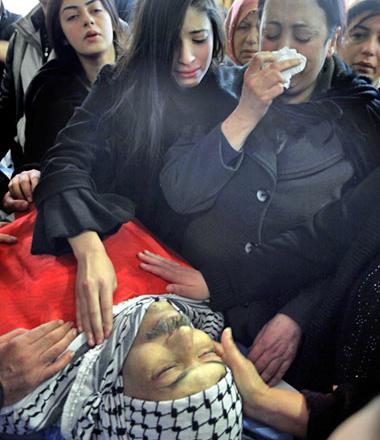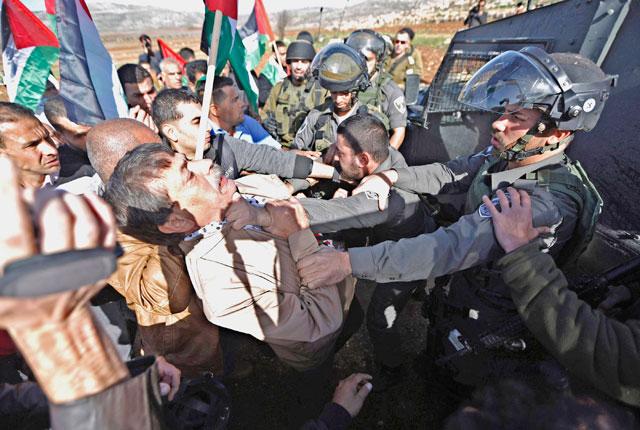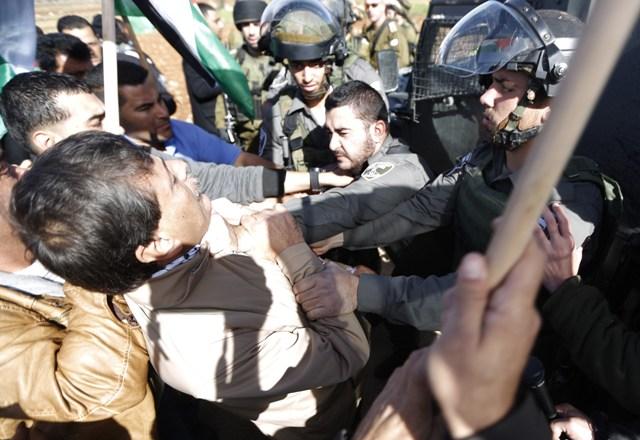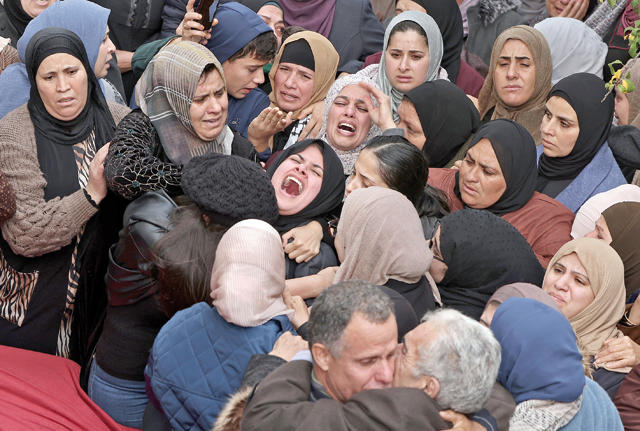You are here
Palestinians mourn official as Israel braces for unrest
By AFP - Dec 11,2014 - Last updated at Dec 11,2014

RAMALLAH — Thousands of Palestinians gathered Thursday to mourn a senior official who died in a confrontation with Israeli troops, as the army sent reinforcements to the West Bank and braced for unrest.
The Palestinian leadership blamed Israel for the "killing" of 55-year-old Ziad Abu Ein, as tensions threatened to boil over into another round of violence in the occupied territories.
Officials and onlookers streamed into the Ramallah headquarters of President Mahmoud Abbas in the late morning, ahead of a planned funeral procession to a nearby cemetery, an AFP correspondent said.
Uniformed Palestinians carried Abu Ein's coffin, draped in a Palestinian flag, into the courtyard, as nationalist songs blared and mourners chanted "Revenge!" and "Your blood will not be spilled in vain!"
Schools were closed in a day of mourning and posters of Abu Ein were plastered on walls throughout the West Bank city.
A short distance away, additional Israeli troops and border guards were being deployed in anticipation of clashes with mourners and protesters, an army spokeswoman said, especially given the cemetery's proximity to the Jewish settlement of Psagot.
Abu Ein died Wednesday after a confrontation with Israeli soldiers during a protest march against settlements by some 300 Palestinians who intended to plant olive trees as a symbolic act, an AFP photographer said.
Troops fired tear gas, three soldiers grabbed Abu Ein and he was struck in the chest during the confrontation. Videos circulating online showed the soldiers pushing Abu Ein firmly in the chest and neck.
He collapsed and was treated by an Israeli army doctor, but died later in hospital.
Israel 'fully responsible'
"After hearing the results of the post-mortem, the Palestinian government holds Israel fully responsible for the killing of Ziad Abu Ein," government spokesman Ihab Bseiso told reporters in Ramallah on Thursday.
A Palestinian minister said the post-mortem, which was carried out by a Palestinian, an Israeli and Jordanian doctors, had shown that Abu Ein was killed by the actions of Israeli troops.
“The reason for the death of Abu Ein was his being hit by [Israeli] occupation troops and because of the heavy use of tear gas,” Palestinian civil affairs minister, Hussein Al Sheikh, told AFP.
Sheikh said Israeli forces had prevented Abu Ein from getting to a hospital quickly enough to save his life.
Israel’s health ministry said the death was caused by a “blockage of the coronary artery” which “could have been caused by stress”, adding that Abu Ein suffered from poor health including heart disease.
The incident prompted Abbas to threaten measures in response.
“All options are open for discussion and implementation,” Abbas told an emergency session of the Palestinian leadership late Wednesday, amid speculation that crucial security cooperation with Israel could be shelved.
Islamist movement Hamas, rivals of Abbas’ West Bank administration and de facto rulers of the Gaza Strip, urged the Palestinian Authority (PA) to cease security coordination immediately.
High tension
Israel’s government urged calm, with Defence Minister Moshe Yaalon expressing regret for the death and saying a military inquiry had been launched.
“Security stability is important for both sides,” he said.
Prime Minister Benjamin Netanyahu sent a message through one of his aides to Abbas in which he “pointed to the need to calm the situation and act responsibly”, his office said.
The death of Abu Ein, who was a former PA deputy minister and was responsible for dealing with the settlement issue, follows months of tensions between Israelis and Palestinians and a wave of unrest in the West Bank and Arab East Jerusalem.
Israelis are on edge after “hit-and-run” car attacks by Palestinians that killed five people, as well as an assault last month that saw two Palestinians burst into a Jerusalem synagogue, leaving four rabbis and a policeman dead.
The tensions have been heightened by Israeli announcements of new settlement construction in East Jerusalem and the West Bank.
Related Articles
A Palestinian minister died on Wednesday shortly after an Israeli security officer shoved and grabbed him by the throat during a protest in the West Bank, an incident Palestinian President Mahmoud Abbas described as barbaric.
A senior Palestinian official died Wednesday after being beaten by Israeli forces during a protest march in the West Bank, medical and security sources told AFP.
RAMALLAH, Palestinian Territories — Israeli forces shot dead four Palestinians in the occupied West Bank Tuesday, Palestinian official



















